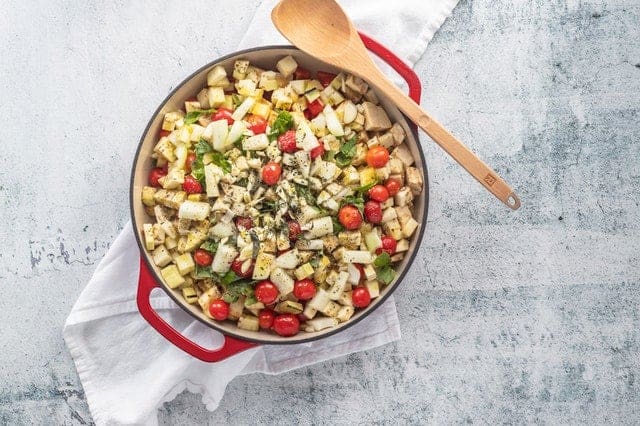What to eat before workout? A very legitimate question, because how we eat, how much we eat and how we compose our post-workout meals has a big impact on our silhouette. Regardless of whether we are adepts of strength training, cardio exercises or other types of activity, we must remember to provide the body with appropriate amounts of proteins and carbohydrates in our daily diet. However, this is only the beginning of dietary recommendations for people who work out.
Each meal in the active diet is important and each has its role to play, with the pre-workout meal being particularly important, as it directly affects our physical performance and influences the work of our muscles. Check what to eat before workout in the morning, and what to eat if the workout takes place in the evening. Find out how to compose your pre-workout meal, so that your exercise brings the desired results.
Table of contents
What to eat before training? It depends on how you train and what you’re aiming for!
If your diet is too low and you don’t provide your tissues and organs with appropriate amounts of proteins, carbohydrates, vitamins, micro- and macroelements or lipids, you can easily exhaust your body, make it unable to regenerate well and, due to the lack of external fuel, it will start ‘eating’ your muscles. On the other hand, a diet too rich, especially in fats and simple sugars, can also be unfavourable for us in the process of body shaping and contribute to excessive growth of fat tissue.
That’s why when you’re in a training cycle it’s worth balancing your diet appropriately, paying a lot of attention to your pre-workout meal, because it affects your mood, energy level, efficiency, strength, or generally your psychophysical form during exercise, and because it ensures optimal transport of nutrients and building materials directly to your muscles.
Although the method of preparing pre-workout meals is similar for all people actively working out, their exact composition depends on several factors.
- Type of workout – if you’re aiming to build muscle mass your pre-workout meal should be different than if you’re trying to get rid of excess body fat and reduce body weight as much as possible.
- Time of workout – the body functions a bit differently just after waking up than in the evening, that’s why we compose our meal differently before the morning workout and differently before the one taking place at a later time.
- Duration and intensity of training – in the case of intensive, long exercise sessions the form of the pre-workout meal is more complex – meals are more abundant and the trainees tend to consume additional snacks just before the activity.
- Type of metabol ism – people with fast metabolism, who burn calories rapidly and start feeling hungry quickly, have more complex meals than people with slow metabolism and a tendency to store fatty acids.
The above mentioned criteria will help us optimize our pre-workout meals to our individual needs. However, there are also some general rules which should be followed regardless of whether you exercise in the morning, afternoon or evening, what your metabolic rate is and what type of workout you prefer.
What to eat before workout – general rules

1) We eat our last big meal about 2 hours before training. If we extend this time we will go to train for example 4 hours after the meal, we will have practically emptied the stomach (after such a time the food has time to be digested), we will start to feel hungry, we will meet with a decrease in psychophysical form and energy, and our training will not be one hundred percent productive.
2) We avoid heavy meals just before we start exercising. Just as training on hungry is not recommended, the same way training with a full belly is not a good idea. Increased activity immediately after eating a large meal may result in deterioration of mood, heaviness, decreased energy, digestive problems, stomach pain, feeling of fullness in the abdomen, nausea, heart disorders, and thus impaired training efficiency.
Avoid composing the last meal on the basis of products with a high glycemic index (that is mainly highly processed products and those containing a lot of white flour, starch and simple sugars). Such products contribute to rapid fluctuations of glucose levels in blood (first a sudden jump, then a significant decrease), which in turn affect the occurrence of postprandial sleepiness and a complete loss of energy and willingness to act. Feeling sluggish and tired makes it difficult to complete an effective workout.
The pre-workout meal should be nutritious and filling but at the same time it should not be too hard to digest. Therefore we avoid fried and fatty foods, as well as calorie bombs such as fast food. We eat lightly, healthily and diversely. It is best to construct meals before the workout in such a way that they are based on complex carbohydrates (groats, rice, wholemeal bread, cereals, wholemeal pasta, vegetables) and protein (leaner meats, fish, eggs). Our meals should also include healthy fats (oil, grains, nuts, vegetable oils) in small amounts.
Taking care of the right composition of pre-workout meals, we also take care of the right fluid supply. Good hydration of the body ensures better training performance and has a positive effect on your mood both during and after exercise.
What to eat before strength training?
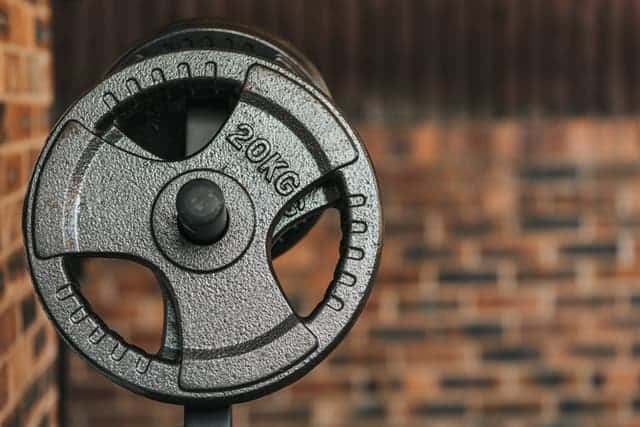
In the menu of people training for strength and aiming to build muscles protein plays a particularly important role. If we don’t take care of the right amount of this component in our diet, our muscles won’t receive enough building material and the mass gain won’t be as effective as we expect.
What’s more, food rich in protein has a positive effect on metabolism and supports the regeneration processes taking place in the body, protecting us from declines in physical shape (which often occur during intensive training cycles).
The optimum protein intake in a weight loss diet is around 2 g per each kilogram of body weight, with the majority of it provided by foods rich in this component (e.g. eggs, lean dairy, legumes, lean meat, fish, seafood, quinoa, tofu). It is best to compose your menu in such a way that high-protein products find a place in each or almost each meal. Additionally we can support ourselves with protein supplements, but we should not exaggerate with their quantity.
What to eat before training for mass? While for a person training for strength, being in the cycle for mass, the presence of protein in each meal is important, in the pre-workout meal it is of exceptional importance. A portion of protein consumed around 1.5 hours before exercise will support anabolic processes in the body and conversely, it will counteract catabolic processes. This will result in better workout productivity and more efficient growth of muscle tissue.
Another important pre-workout ingredient is carbohydrates with a low glycaemic index, which are characterised by providing the body with gradually released, long-lasting energy. These are mainly complex carbohydrates found in groats, wholemeal pasta, oatmeal, wholemeal bread and vegetables.
After eating a large portion of complex carbohydrates as part of a pre-workout meal you will feel satiated for a long time, you won’t complain about post-workout sleepiness and energy loss (as it happens when you base your meal on products with a high glycaemic index), you’ll feel strong and energetic for hours, and you’ll enjoy a good mood during exercise. It will certainly have a very positive impact on our training performance.
A big meal before the strength training should be eaten about 1,5 hour before the planned visit in the gym. However just before or during exercise it’s good to consume a small portion of simple carbohydrates (e.g. in the form of juice or fruit), which are the fastest and the easiest source of energy for our body, and which help to replenish glycogen in the muscles and liver (glycogen is a polysaccharide that promotes good muscle condition, it is an energy reserve and protects us from fatigue, exhaustion and tiredness).
Such a meal composition before strength training will give you energy and strength to work with heavy loads, while at the same time (thanks to protein) activating the process of muscle mass growth.
Remember that intensive exercise requires a powerful dose of energy from food. Pre-workout meals must be substantial and fairly substantial, but still easily digestible. We should avoid meals with a high content of fat and highly processed dishes, which could disrupt digestive processes, disrupt sugar metabolism, put us in a state of fatigue and sluggishness and thus significantly reduce our ability to train.
What to eat before the gym – 5 ideas for meals before strength training
- Buckwheat groats, grilled chicken liver with apples and marjoram, beetroot salad
- Brown rice, baked fish in herbal marinade (e.g. hake, cod, sole), salad of Chinese cabbage, peppers, corn and green cucumber
- Wholemeal penne pasta, sauce made of canned tomatoes, minced turkey meat, garlic, basil and oregano
- Roasted yams, roasted or grilled chicken breast with honey mustard sauce, steamed broccoli
- Omelette made of egg whites, bran and oatmeal, topped with spinach leaves, tomatoes, olives, mozzarella cheese
Portion sizes are adjusted to individual weight, daily activity level, metabolic rate and current training program.
Looking for effective muscle building boosters? Click:
Testosterone boosters – ranking
What to eat before cardio workout?

cardio workout (that is aerobic, aerobic training, characterized by moderate intensity) is the most popular type of physical activity, especially preferred by people who care about a healthy lifestyle, care about their heart, want to permanently improve their mood and take care of better immunity of their body. cardio training is also the most popular choice for people who want to lose weight.
It’s worth noting that meals eaten before cardio workout can directly affect both our performance during the exercise and the results in terms of weight loss. So what to eat before workout on reduction? How to increase the efficiency of aerobic workouts with the help of diet?
The most important task of the meal before cardio training is to provide a large injection of energy, which will be gradually released over a long period of time, stimulate metabolism and effectively fill the stomach, so that we don’t feel hungry too quickly.
What to eat before workout to lose weight?
For a cardio workout to be effective, it must last a sufficient amount of time. It is best if the activity lasts more than 40 minutes, and already half an hour is an absolute minimum. Only after this time does more intensive fat burning begin.
If we do not want to feel energy loss, fatigue, exhaustion or discouragement during our 45-minute or hour-long workout, we need to properly charge our batteries beforehand. To that end, about 1.5 hours before training it’s worth eating a decent meal with high nutritional value.
When composing meals, it is worth ensuring that they contain significant amounts of such components as:
- Dietaryfibre (regulates metabolism, ensures gradual release of glucose into the blood, maintaining high energy levels for a long time, gives a feeling of satiety for a long time)
- Protein (speeds up metabolism, improves muscle function, contributes to high exercise performance)
- Vitamins (nourish the body, add energy and vitality, have a positive effect on physical and mental condition)
- Minerals such as magnesium, calcium, potassium, sodium (ensure water-electrolyte balance, have a positive effect on mood, improve muscle function, improve exercise performance)
How to prepare a pre-workout meal cardio (sample sets)
- Wholemeal ribbon pasta or tubes with shrimps and vegetables (e.g. carrots, leek, peppers, green peas, parsley), fruit and vegetable cocktail
- Cream of red bean soup, salad with brown rice, tuna and vegetables, half a grapefruit
- Braised turkey breast with mushrooms and thyme, green beans, barley, celery, leek and carrot salad
- Wholemeal tortilla with chicken, feta cheese, cherry tomatoes, chopped Chinese cabbage, cucumber, bell pepper, radishes, topped with garlic yoghurt sauce
- Eggs fried on tomatoes (with blue cheese, fresh coriander, basil or parsley) served with wholemeal bread or groats
A good source of energy and an intensive fat reducer in one: Cappucino MCT
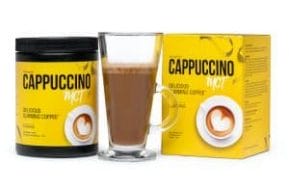
What to eat before morning workout?
Many people who train in the morning have a problem with choosing the right breakfast. The body functions in a specific way in the first hours after waking up. It needs a big boost of energy and a large dose of nutrients to function efficiently for many hours.
So if you’re heading out for a workout soon after waking up, no matter what type of workout you’re doing, you should make sure you have a nutritious, big, filling breakfast. Failure to eat a nutritious, large and filling breakfast can lead to poor performance, energy depletion (both during training and throughout the day), low mood and difficulty in achieving your training goals.
It’s best to prepare your pre-workout meal in the morning according to the following formula:
- the basis of the meal are complex carbohydrates (cereals, wholemeal bread, grains and nuts),
- the second most important place on the plate belongs to protein (eggs, dairy products, fish, lean meats),
- add vegetables or fruit, or both.
Sample breakfasts for those training in the morning
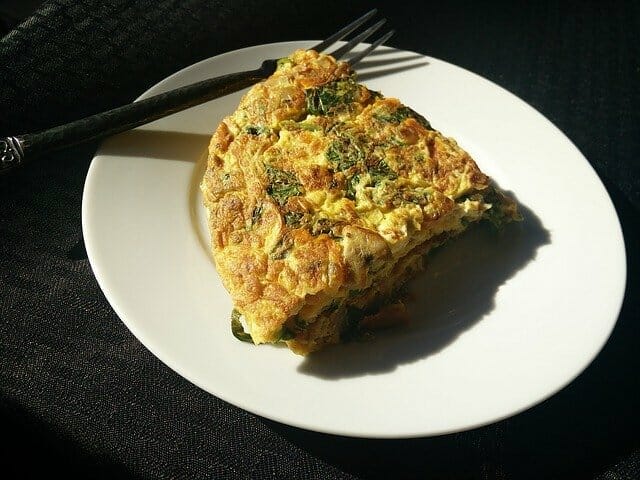
- Mixture of cereals (e.g. oatmeal, rye, buckwheat) plus raisins, dried plums, dried banana with milk
- Cottage cheese with radishes and green cucumber, wholemeal roll with sirloin and tomato
- Scrambled eggs with mushrooms and peppers, wholemeal bread, pickled cucumber as a side dish
- Salad with quinoa, blue cheese, ham, cucumber, tomatoes and basil
- Omelette with bran and kale, accompanied by a light salad of tomatoes, black olives, peppers and cucumber
The size of the portions should be chosen individually depending on your weight, lifestyle and metabolic rate. After such a meal we should feel satiated, but on the other hand we should not overeat either.
What is important is that you should not eat immediately before exercising (it is best to wait about an hour), because in such a case you would, firstly, feel discomfort in your stomach and it would be difficult for you to train, and secondly your body would use all its energy for digestion, your efficiency and strength would suffer and there would be no effective training.
What to eat before training in the evening?
If we are enthusiasts of evening workout, we should have a nutritious, valuable meal about 1 hour or 1,5 hour before exercising. This will give us energy and strength to accomplish our training intentions, and on the other hand it will protect us from an attack of increased, uncontrollable hunger which could “get us” after the training or, what’s worse, at night if we go to exercise with an empty stomach.
People who usually eat a late dinner (e.g. around 5 or 6 pm) have it easier when it comes to the evening pre-workout meal. On the other hand, if you eat your main meal in the early afternoon you should try to make a nutritious afternoon snack or an early dinner before each visit to the gym.
What products and dishes we choose depends on our preferences, the most important thing is that such a meal should include complex carbohydrates, as well as a portion of protein and some vegetables or fruit.
Suggestions for meals before training in the evening
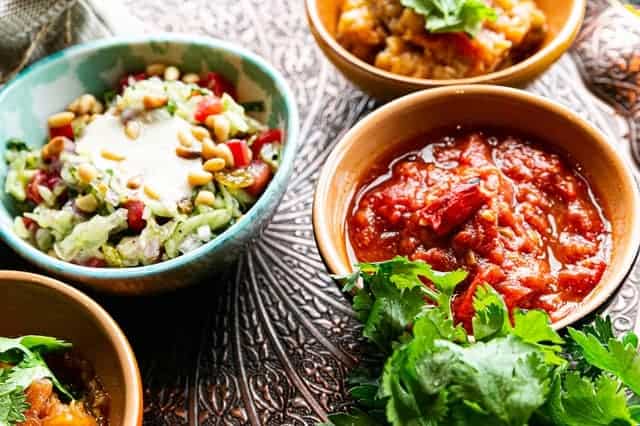
- Wholemeal bread sandwiches with lettuce, cottage cheese and sardines
- Leek made from courgettes, peppers and tomatoes with a side of lean chicken sausage
- Oven chips made from various vegetables (e.g. carrots, celery, parsley), accompanied by a piece of roast turkey breast and sauerkraut salad
- Salad with smoked salmon, hard-boiled egg, feta cheese, lettuce, tomatoes and cucumber
- Buckwheat pudding with blueberries, nuts and sunflower seeds
- Dessert of brown rice, stewed pears, natural yogurt and nuts

